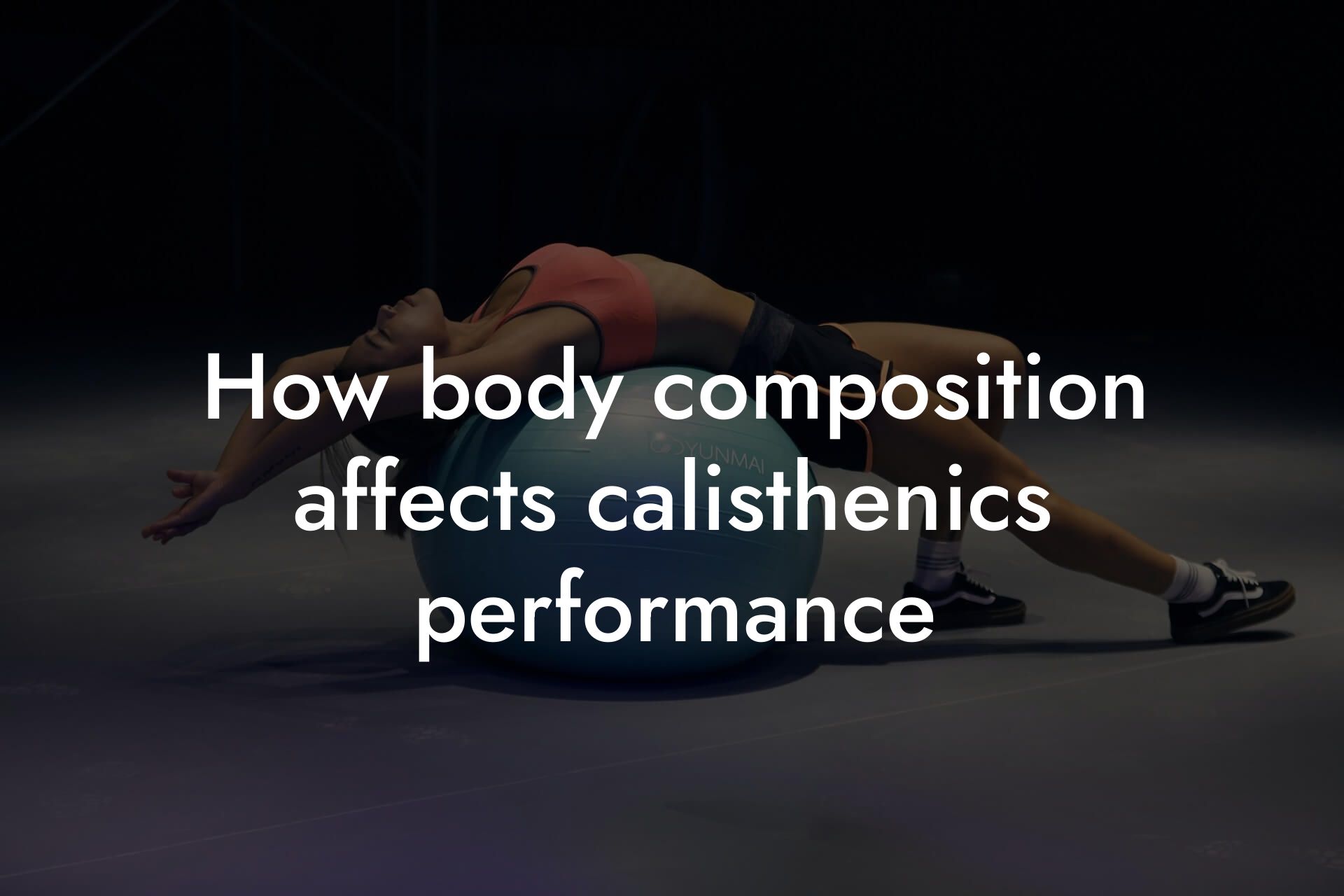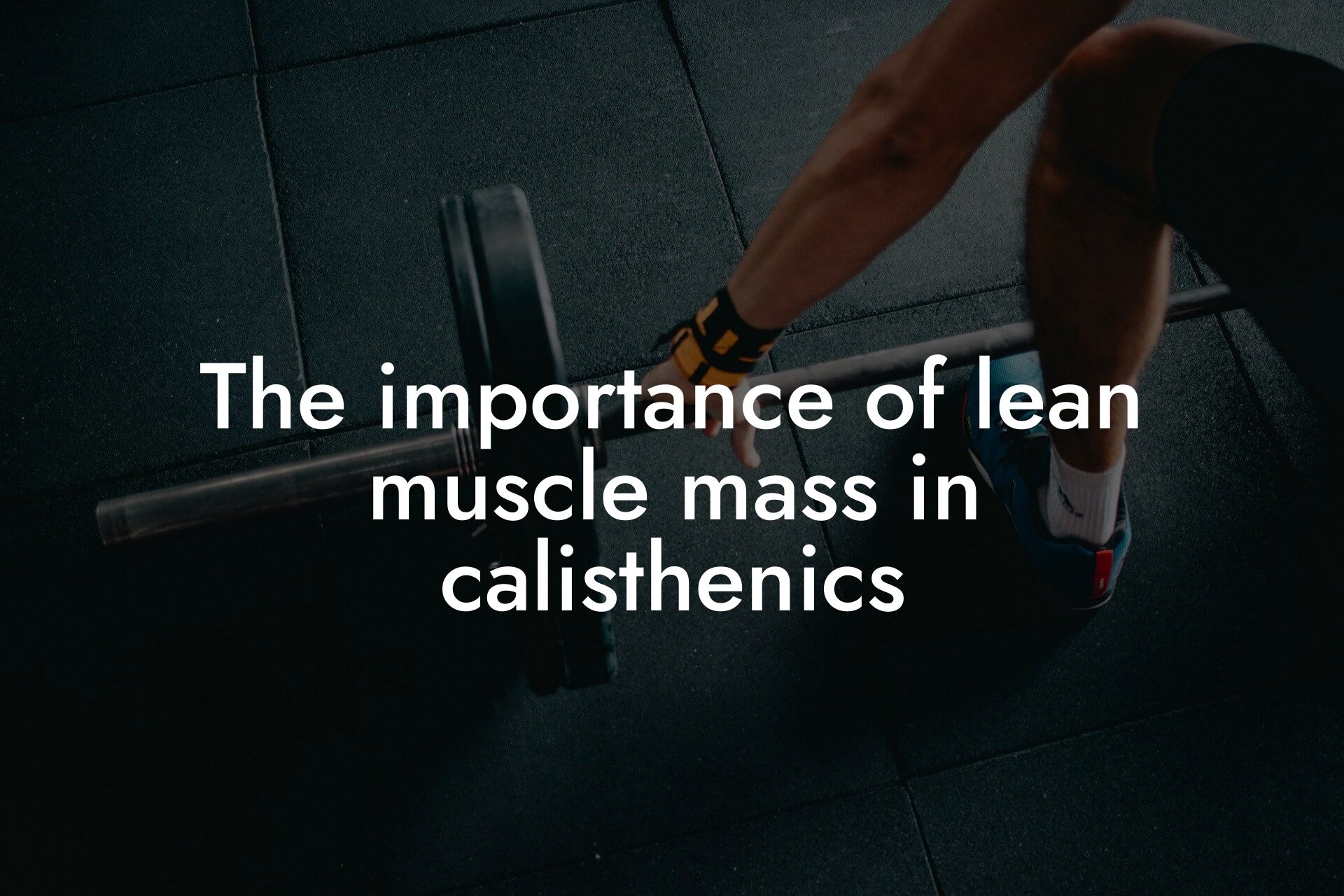As a calisthenics athlete, you understand the importance of proper nutrition in fueling your body for optimal performance. A well-planned diet can help you achieve your fitness goals, whether it's building muscle, increasing endurance, or improving overall health. At Tano Performance Group, we're committed to providing you with the knowledge and tools you need to take your physique to the next level. In this article, we'll dive into the essential nutrition tips for calisthenics athletes, helping you make informed decisions about your diet and training.
Table of Contents
- Caloric Intake and Macronutrient Balance
- Protein Requirements
- Carbohydrate Sources and Timing
- Healthy Fats and Omega-3 Rich Foods
- Hydration and Electrolytes
- Meal Frequency and Timing
- Supplements and Performance
- Periodized Nutrition and Training
- Tracking Progress and Adjusting Your Diet
- Frequently Asked Questions
Caloric Intake and Macronutrient Balance
As a calisthenics athlete, your caloric intake plays a crucial role in your performance and recovery. You need to ensure you're consuming enough calories to support your energy needs, while also maintaining a balanced macronutrient profile. Aim to consume a daily caloric intake of 15-20% above your maintenance level, with a macronutrient breakdown of 2-3 grams of protein, 2-3 grams of carbohydrates, and 0.5-1 gram of healthy fats per kilogram of body weight.
Protein Requirements
Protein is essential for muscle growth, repair, and maintenance. As a calisthenics athlete, you require a higher protein intake to support muscle recovery and growth. Aim to consume 1.6-2.2 grams of protein per kilogram of body weight, spread across 3-5 main meals and 2-3 snacks. Good sources of protein include lean meats, fish, eggs, dairy, and plant-based options like legumes, nuts, and seeds.
Carbohydrate Sources and Timing
Carbohydrates provide energy for your workouts and help with recovery. Focus on complex carbohydrates such as whole grains, fruits, and vegetables, which are rich in fiber, vitamins, and minerals. Aim to consume 2-3 grams of carbohydrates per kilogram of body weight, with a focus on pre-workout and post-workout meals. Good sources of carbohydrates include brown rice, quinoa, sweet potatoes, and whole-grain bread.
Healthy Fats and Omega-3 Rich Foods
Healthy fats are essential for hormone production, brain function, and overall health. Include sources of healthy fats like nuts, seeds, avocados, and olive oil in your diet. Omega-3 rich foods like fatty fish, flaxseeds, and chia seeds can help reduce inflammation and support recovery. Aim to consume 0.5-1 gram of healthy fats per kilogram of body weight.
Hydration and Electrolytes
Adequate hydration is crucial for performance and recovery. Aim to consume at least 8-10 glasses of water per day, with an additional 1-2 glasses for every hour of intense training. Electrolytes like sodium, potassium, and magnesium are lost through sweat and are essential for maintaining proper hydration. Include electrolyte-rich foods like bananas, avocados, and coconut water in your diet.
Meal Frequency and Timing
Meal frequency and timing play a crucial role in supporting your training and recovery. Aim to eat 3-5 main meals and 2-3 snacks per day, spaced out every 2-3 hours. This will help maintain a stable energy level and support muscle recovery. Pre-workout meals should include a balance of carbohydrates, protein, and healthy fats, while post-workout meals should focus on carbohydrates and protein for recovery.
Supplements and Performance
While a well-planned diet should be your primary focus, supplements can help support your training and recovery. Popular supplements for calisthenics athletes include protein powder, creatine, and branched-chain amino acids (BCAAs). However, always consult with a healthcare professional or registered dietitian before adding any new supplements to your regimen.
Periodized Nutrition and Training
Periodized nutrition and training involve adjusting your diet and training plan to match your specific goals and training phases. This can help optimize your performance and recovery. For example, during a strength-building phase, you may increase your protein intake and focus on compound exercises like squats and deadlifts. During an endurance phase, you may increase your carbohydrate intake and focus on high-intensity interval training (HIIT).
Tracking Progress and Adjusting Your Diet
Tracking your progress and adjusting your diet accordingly is crucial for achieving your fitness goals. Use tools like a food diary or mobile app to track your macronutrient intake, meal frequency, and training performance. Regularly assess your body fat percentage, muscle mass, and bone density using tools like a DEXA machine to ensure you're on track. Make adjustments to your diet and training plan as needed to optimize your results.
Frequently Asked Questions
What is the importance of nutrition for calisthenics athletes?
Nutrition plays a crucial role in the performance and recovery of calisthenics athletes. A well-planned diet provides the necessary energy, macronutrients, and micronutrients to support muscle growth, strength, and endurance. Adequate nutrition also helps to prevent injuries, reduce muscle soreness, and support overall health.
What are the key macronutrients for calisthenics athletes?
The three key macronutrients for calisthenics athletes are carbohydrates, protein, and fat. Carbohydrates provide energy for high-intensity exercises, protein supports muscle growth and repair, and fat provides energy and supports hormone production.
How many calories do calisthenics athletes need?
The caloric needs of calisthenics athletes vary depending on factors such as age, sex, weight, height, and activity level. Generally, calisthenics athletes require a caloric intake of 2500-4000 calories per day, with a daily caloric surplus of 250-500 calories to support muscle growth and recovery.
What is the ideal protein intake for calisthenics athletes?
The ideal protein intake for calisthenics athletes is 1.6-2.2 grams of protein per kilogram of body weight per day, spread out over 3-5 meals. This ensures adequate protein synthesis and muscle repair.
What are the best sources of protein for calisthenics athletes?
The best sources of protein for calisthenics athletes include lean meats such as chicken, fish, and turkey, as well as plant-based sources like beans, lentils, and tofu. Eggs, dairy products, and protein supplements can also be useful.
How much carbohydrate do calisthenics athletes need?
Calisthenics athletes require 2-3 grams of carbohydrate per kilogram of body weight per day, with a focus on complex carbohydrates such as whole grains, fruits, and vegetables.
What are the best sources of complex carbohydrates for calisthenics athletes?
The best sources of complex carbohydrates for calisthenics athletes include whole grains like brown rice, quinoa, and whole wheat, as well as fruits and vegetables like sweet potatoes, bananas, and broccoli.
How much fat do calisthenics athletes need?
Calisthenics athletes require 0.5-1 gram of fat per kilogram of body weight per day, with a focus on healthy fats like nuts, seeds, avocados, and olive oil.
What are the best sources of healthy fats for calisthenics athletes?
The best sources of healthy fats for calisthenics athletes include nuts and seeds like almonds, walnuts, and chia seeds, as well as avocados, olive oil, and fatty fish like salmon.
What is the role of hydration in calisthenics training?
Adequate hydration is essential for calisthenics athletes, as it helps to regulate body temperature, transport nutrients and oxygen to muscles, and remove waste products. Aim to drink at least 8-10 glasses of water per day.
What are the best hydration strategies for calisthenics athletes?
The best hydration strategies for calisthenics athletes include drinking water before, during, and after exercise, as well as consuming electrolyte-rich beverages like coconut water or sports drinks during high-intensity exercises.
What are the key micronutrients for calisthenics athletes?
The key micronutrients for calisthenics athletes include vitamins C and D, calcium, iron, and omega-3 fatty acids. These micronutrients support immune function, bone health, and muscle recovery.
What are the best sources of micronutrients for calisthenics athletes?
The best sources of micronutrients for calisthenics athletes include fruits and vegetables like citrus fruits, leafy greens, and bell peppers, as well as fortified dairy products, fatty fish, and whole grains.
How can calisthenics athletes support their immune system through nutrition?
Calisthenics athletes can support their immune system through nutrition by consuming a diet rich in fruits, vegetables, whole grains, and lean protein sources, as well as staying hydrated and getting adequate sleep.
What are the common nutrition mistakes made by calisthenics athletes?
Common nutrition mistakes made by calisthenics athletes include inadequate caloric intake, poor macronutrient balance, inadequate hydration, and neglecting to consume a post-workout meal or snack.
How can calisthenics athletes optimize their nutrition for competition?
Calisthenics athletes can optimize their nutrition for competition by increasing their caloric intake, focusing on complex carbohydrates and lean protein sources, and staying hydrated. They should also avoid heavy meals and focus on light, easily digestible foods in the hours leading up to competition.
What is the role of supplements in calisthenics training?
Supplements can play a role in calisthenics training by providing additional nutrients and support for muscle growth and recovery. However, they should not replace a healthy diet and should be used under the guidance of a healthcare professional or registered dietitian.
What are the most effective supplements for calisthenics athletes?
The most effective supplements for calisthenics athletes include protein powder, creatine, and branched-chain amino acids (BCAAs). These supplements can help to support muscle growth, strength, and recovery.
How can calisthenics athletes ensure they are getting enough sleep and recovery?
Calisthenics athletes can ensure they are getting enough sleep and recovery by aiming for 7-9 hours of sleep per night, taking rest days as needed, and incorporating stretching and foam rolling into their routine.
What are the consequences of inadequate nutrition and recovery for calisthenics athletes?
The consequences of inadequate nutrition and recovery for calisthenics athletes include decreased performance, increased risk of injury, and impaired muscle growth and recovery.
How can calisthenics athletes track their nutrition and progress?
Calisthenics athletes can track their nutrition and progress by keeping a food diary, tracking their macronutrient intake, and monitoring their body fat percentage, weight, and performance metrics.
What are the benefits of working with a registered dietitian or nutrition coach for calisthenics athletes?
The benefits of working with a registered dietitian or nutrition coach for calisthenics athletes include personalized nutrition planning, improved performance, and enhanced recovery. A registered dietitian or nutrition coach can also help athletes to develop a healthy relationship with food and avoid nutrition-related pitfalls.
How can calisthenics athletes stay motivated and consistent with their nutrition plan?
Calisthenics athletes can stay motivated and consistent with their nutrition plan by setting clear goals, tracking their progress, and finding a support system of like-minded individuals. They should also focus on progress, not perfection, and be kind to themselves when they make mistakes.
Here are some related articles you might love...
- Using DEXA scans to monitor progress in calisthenics
- How body composition affects calisthenics performance
- The importance of lean muscle mass in calisthenics
- Preventing injuries in calisthenics: A comprehensive guide
- Strength and conditioning programs for calisthenics practitioners
- Reducing body fat for improved strength-to-weight ratio in calisthenics
- Recovery strategies for calisthenics athletes
- Bone density and its role in calisthenics training
- How to build functional strength with calisthenics
Zak Faulkner
Zak Faulkner is a leading authority in the realm of physical health and body composition analysis, with over 15 years of experience helping professionals optimise their fitness and well-being. As one the experts behind Tano Performance Group, Zak has dedicated his career to providing in-depth, science-backed insights that empower clients to elevate their physical performance and overall health.
With extensive knowledge of DEXA technology, Zak specializes in delivering comprehensive body assessments that offer precise data on body fat, muscle mass, bone density, and overall physique. His expertise enables individuals to make informed decisions and achieve their fitness goals with accuracy and confidence. Zak’s approach is rooted in a deep understanding of human physiology, combined with a passion for helping clients unlock their full potential through personalised strategies.
Over the years, Zak has earned a reputation for his commitment to excellence, precision, and client-focused service. His guidance is trusted by top professionals who demand the best when it comes to their health. Whether advising on fitness programs, nutritional strategies, or long-term wellness plans, Zak Faulkner’s insights are a valuable resource for anyone serious about taking their health and fitness to the next level.
At Tano Performance Group, Zak continues to lead our Content Team revolutionising how professionals approach their physical health, offering unparalleled expertise that drives real results.




